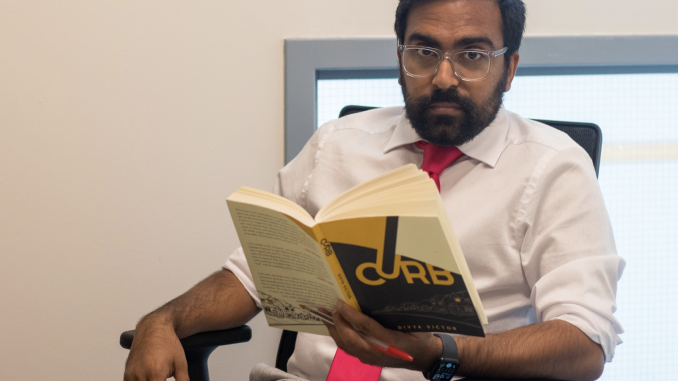
Gianna McCarthy (gimccarthy@ursinus.edu)
Assistant Professor Jay Shelat joined the Ursinus College staff just this Fall semester and is the latest addition to the school’s English Department. Shelat shares that he “loved how warm and welcoming everyone has been at Ursinus. The support tells me that one of the College’s foundational tenets is community.”
Professor Shelat is originally from Atlanta, Georgia, received his B.A. and M.A. from Georgia State University, and is specifically trained in 20th and 21st century literature. Shelat then went on to attend the University of North Carolina, Greensboro in order to obtain his PhD in English. While working toward his PhD, Shelat was also teaching various types of English classes at UNCG and received the university’s English Department’s 2021 Outstanding Graduate Teaching Award for his dissertation: “Ordering the Chaos: Family, Nation, and Terrorism in Post-9/11 Anglophone Fiction.”
Shelat’s research interests include the millennial novel/contemporary literature, which cater to a specific audience (especially BIPOC and queer) rather than a universal one, the processes of racialization and racialized violence, and Bollywood. His current research is on literature concerning 9/11 as well as the Global War on Terrorism. His latest book project “examines the ways in which 9/11 and the War on Terror influence familial and domestic dynamics.”
This semester, Shelat is teaching two English classes. The first is ENGL-104 with the topic War on Terror Literature, which covers “how Western imperialism continues to shape the Greater Middle East. Through postcolonial and feminist approaches to the conflict and the literature, [students] will also scrutinize the notion of periodization and the very phrase ‘War on Terror’ by considering the region’s larger history.” The other class he is teaching this semester is ENGL-310: Topics in the Novel, currently covering The 9/11 Novel. This class looks into the aftermath of 9/11 and how the time after “the attacks disproportionately affect[ed] people of color.” Shelat mentioned that his classes “emphasize classroom engagement and lots of writing,” as they “are the most fun ways to analyze literature.”
When asked about the interview process at Ursinus, Shelat said it “was not daunting at all,” and attributed it to the welcoming community at the college. Additionally, he admitted, “unlike the other interviews I had, Ursinus’s interview was collegial and exciting. Everyone was so kind and fun.” As part of his interview process last spring Shelat taught a lesson to Dr. Jaroff’s ENGL-290 W class that involved analyzing poetry dedicated to some of his research interests.
On a more personal note, Shelat shared that some of his “not-so-exciting” hobbies include “running, cooking, reading, watching movies, etc. I also really love singing, even though I sound worse than a spoon stuck in the garbage disposal.” He also noted that he watches “a lot” of television, particularly reality tv, saying he loves “The Real Housewives, which I think is the most political thing on tv right now. There is no better gender, race, and class critique.”
Moreover, when asked about his favorite literature, Shelat replied, “Asking an English professor their favorite books/writers is a tricky question,” adding, “I love all fields and eras of literature from all around the world. It sounds cliche, but enjoying all the kinds of books from everywhere really allows me to see the possibilities of literature. So, lately, I’ve been taking in authors who do really weird stuff–those who really push the limits of fiction in particular: Helen Oyeyemi, Sayaka Murata, Percival Everett, Kazuo Ishiguro. Toni Morrison, Colson Whitehead, and Shakespeare are the literary stars who shine brightest for me.”
If that wasn’t enough to convince someone of Shelat’s devotion to the English subject, he also writes every day. He mentioned that this part of his daily routine is “Something I’m very protective of: the few hours in the early morning that I devote to research. I fundamentally believe that writing and teaching are mutually beneficial acts and processes.”
We are very glad to have you at Ursinus College, Professor Shelat, and cannot wait to see what else you will contribute to our community.
